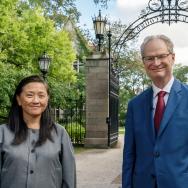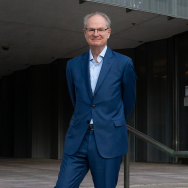The David Rubenstein Forum was envisioned as a space where the University of Chicago’s tradition of intellectual engagement as well as the pursuit of knowledge and understanding could flourish.
At a Sept. 22 event celebrating the Forum’s opening, President Paul Alivisatos reflected upon the building’s symbolic meaning, and the opportunities it will present for civic, social and intellectual engagement.
“This Forum is a wonderful place for those things to happen in,” Alivisatos said. “But it also looks to the city. It looks to the north. It looks to the south. It seeks, by that architecture, to show that the future of a great university like this is interwoven deeply with how it connects to society.”
The event featured Alivisatos and three past University presidents discussing their experiences as leaders as well as their perspectives on what makes UChicago one of the world’s leading research universities. Joining Alivisatos, who began his tenure Sept. 1, were Chancellor Robert J. Zimmer, who recently concluded 15 years as president; Don Michael Randel, who served from 2000-06; and Hanna Holborn Gray, who led the University from 1978-93.
For about an hour, they talked with moderator David Rubenstein, JD’73, the University of Chicago trustee whose support made possible the construction of the 10-story building, located at Woodlawn Avenue and 60th Street. The event celebrated the people and ideas that laid the foundation for the University’s successes, and the community that will help build its future.
A distinctive culture of rigorous inquiry has long defined UChicago, persisting even through moments of historic turbulence. Gray recalled how, during her tenure, the 1970s energy crisis caused inflation to soar and college endowments to plummet across the country. “And yet,” she said, “what I found was that the University still had the most important endowment that it could. And that was the sense of loyalty to a vision of what a university could be, and what the University of Chicago, at its best, actually was.”
Gray said UChicago remained dedicated to teaching people how to think, even “in ways that could be difficult, that might be painful.” That principle, she stressed, set it apart from other institutions of higher education: “In a sense, that the University was the university. That it was unlike others. That it had a special character that was worth cultivating and preserving. That was the endowment that was still here, and that was what you could build on.”
Free expression and open discourse are still hallmarks of today’s University of Chicago. Asked to reflect on the accomplishments of his presidency, Zimmer pointed to his efforts to defend those ideals, both in Chicago and across higher education.
“Decisions constraining who should speak and what people should be allowed to hear is a very dangerous one for the academy,” he said. “It’s totally contrary to what a university should be, and we needed to take a strong position about that.”
Zimmer pointed to his efforts in helping establish the Pritzker School of Molecular Engineering as an example of how universities need to continually evolve.
“I was happy to see a set of people who were willing to challenge very old assumptions,” Zimmer said of PME, which recently celebrated its 10th anniversary. “Seeing that happen in such a successful and scientifically powerful way is very gratifying.”
The current and former University presidents also discussed the importance of growing the undergraduate College. Plans for expanding the undergraduate student body were the subject of debate during the tenure of the late Hugo Sonnenschein, who preceded Randel. Looking back at that period, Randel emphasized that the culture of the University matters more than the numerical balance between graduate and undergraduate students.
“It’s not a question of which number is which,” Randel said, “but that you should try to preserve the spirit that derives from a strong presence of research and graduate programs. Every undergraduate who came here could not fail to notice that this place was about having original ideas.”
Near the end of the night, Rubenstein asked each of the speakers what they would ask William Rainey Harper, the University’s first president. Gray wondered what Harper would have thought of Chimes, a 1926 novel that described a fictionalized version of UChicago. Randel thought of Harper’s conversations with John D. Rockefeller, the University’s philanthropic founder.
Zimmer and Alivisatos both wanted to bring Harper from 1890 to the present.
“How did he think it all turned out?” Alivisatos added. “If he had the chance to look at it today, would he see it the same way?”
Looking forward, Alivisatos said the University has an opportunity to engage with people on Chicago’s South Side and across the globe on complex issues, ranging from climate change to bioscience to questions of free expression and democracy.
“I believe a kind of engaged University of Chicago will emerge in the coming years,” he said. “I hope, during my presidency, that that’s something we will all explore together, and create something very special.”

